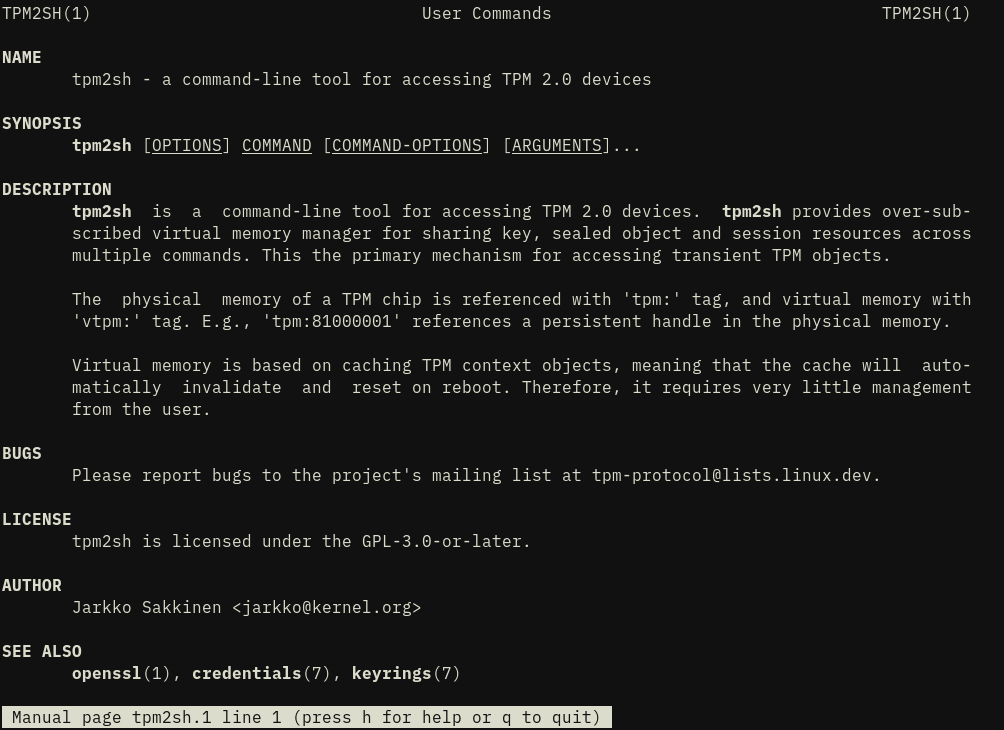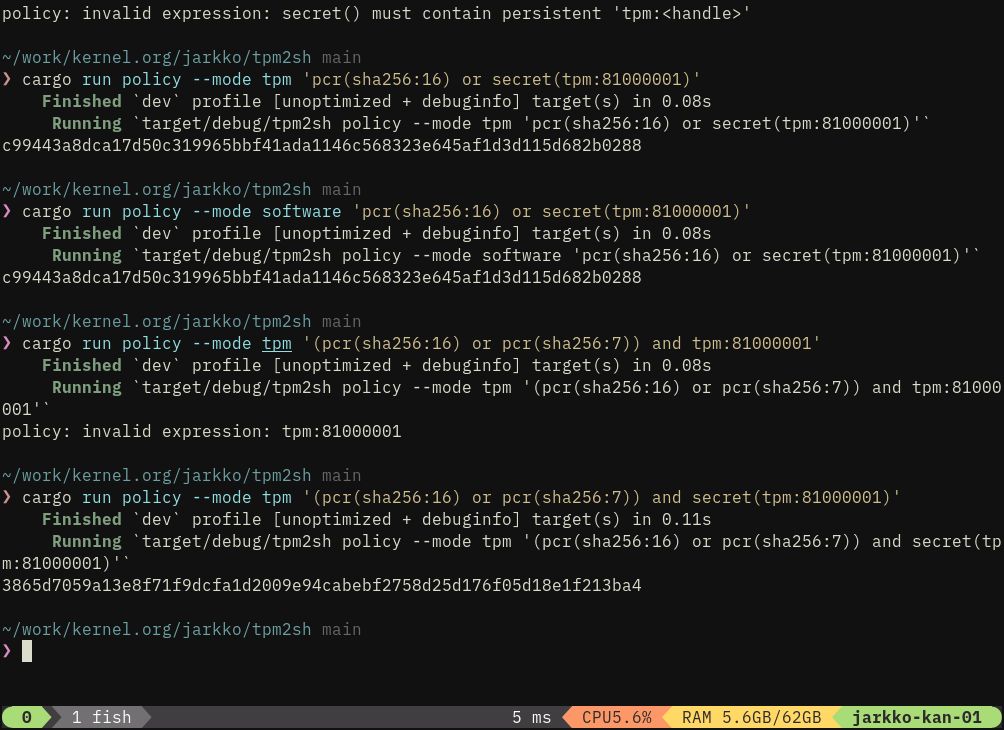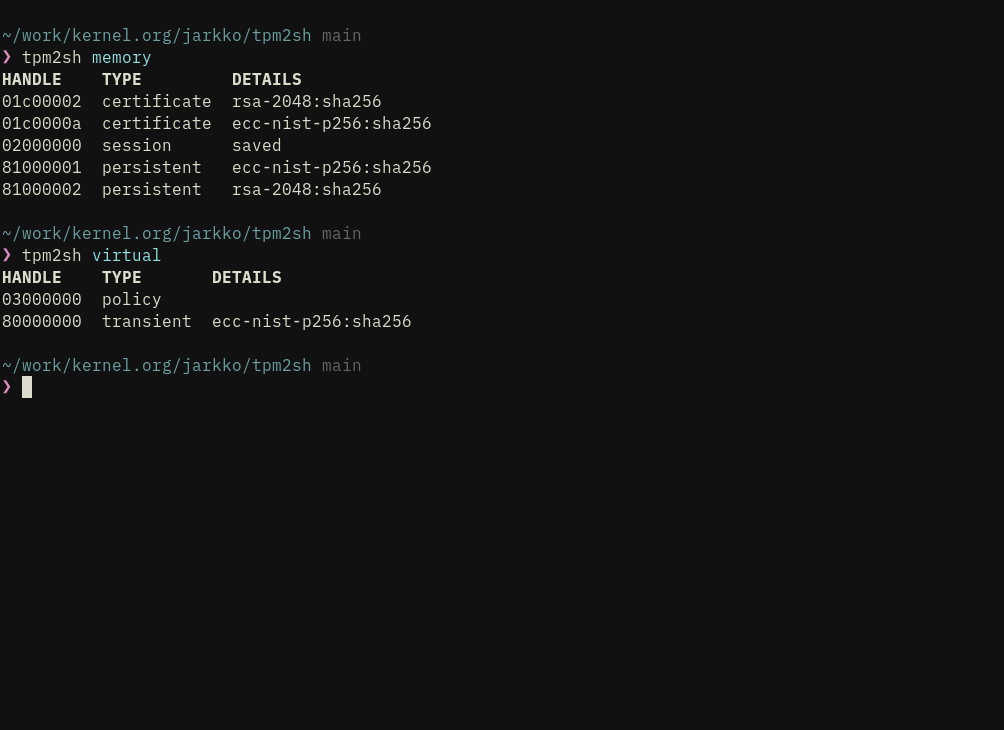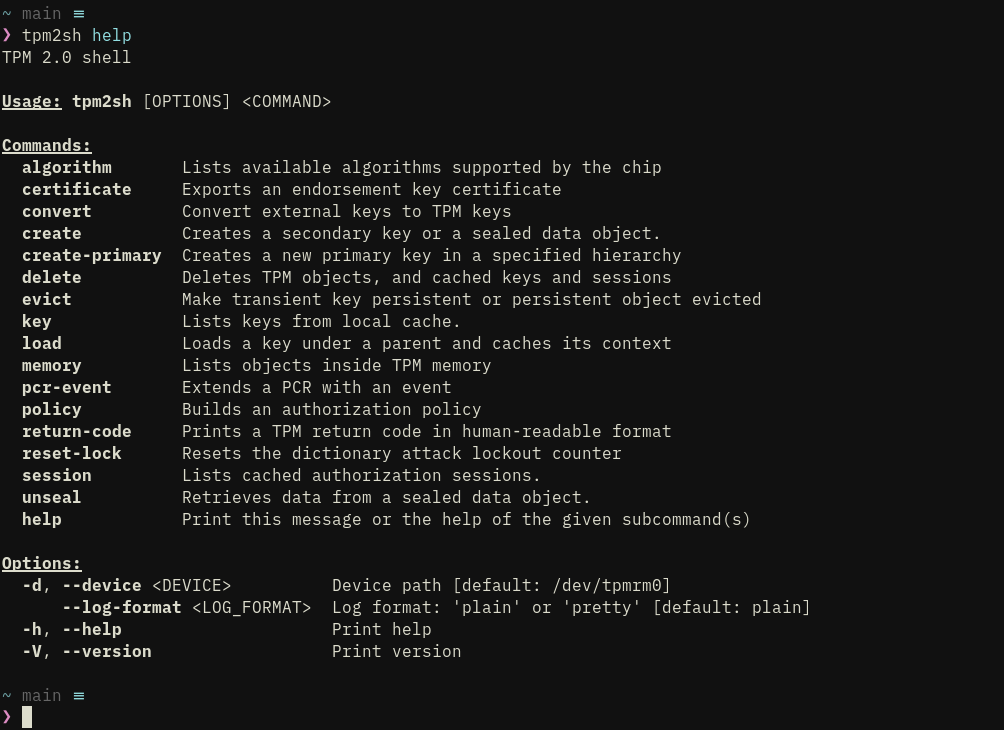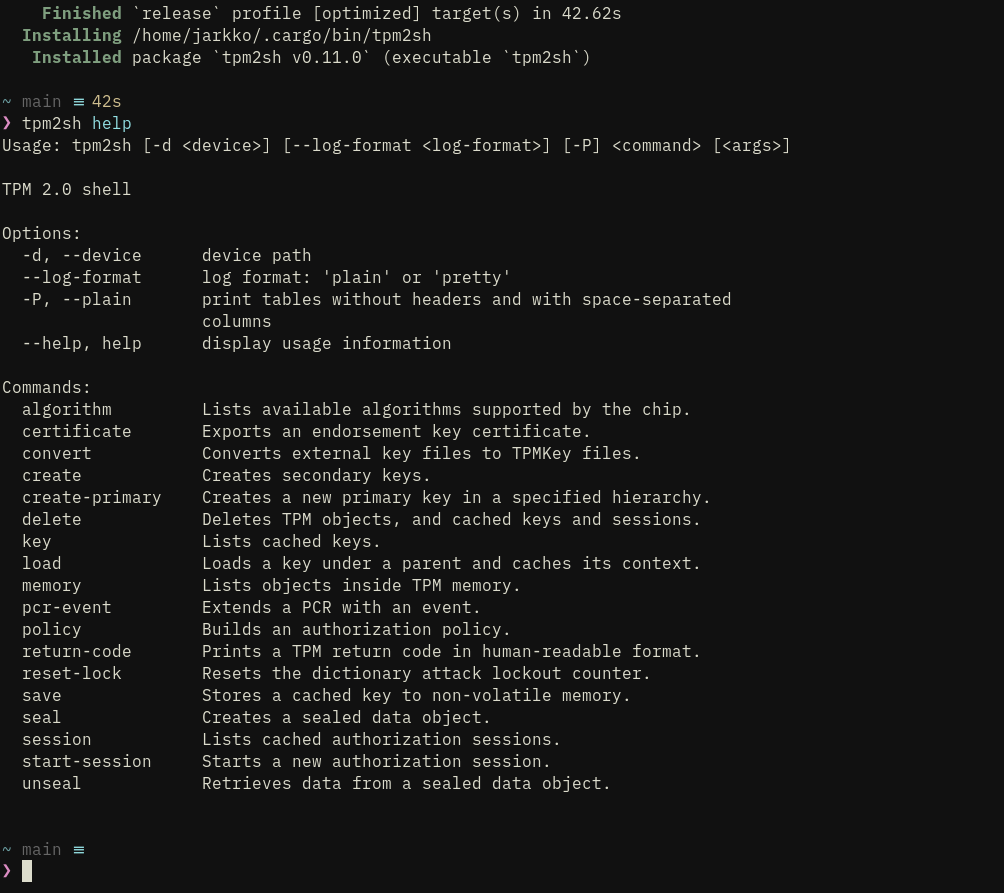Posts
4887Following
324Followers
489OpenPGP: 3AB05486C7752FE1
Jarkko Sakkinen
jarkkohttps://crates.io/crates/tpm2sh
#linux #rustlang #tpm
Jarkko Sakkinen
jarkkoJarkko Sakkinen
jarkkoI’m planning to iteratively make tpm2sh policy subcommand to compile policy expressions first into eBPF i.e., --mode ebpf option.
We can use this to address bottleneck in trusted keys in kernel: TPMKey ASN.1 provides key blob but not steps how to create policy session that authorizes the key.
Today: TpmKey ASN.1 with auth value and policy digest can be passed but really only auth value (+ PCR selection in TPM2_Create) can be used for authentication.
My vision for policy protected keys is basically:
- Key data is passed as TPMKey ASN.1 just like today.
- In addition eBPF program for creation policy session is passed when policy digest is used.
It’s perfectly secure given that a malicious eBPF program would end up to a different policy digest than what is associated with the key.
Jarkko Sakkinen
jarkkotpm2sh 0.11.16
This is the release where things mostly work and is first usable version for wider audience than just me.
Functionality is focused on key management and it is quite limited on operations.
That said, it the most important functionalities, and most difficult to implement, in place:
- Implicit creation of HMAC sessions to protect communication, and hiding its complexity . It is still a stub as parameter encryption is not in place but the mechanism is working correctly.
- Key management including direct support for PKCS#1, PKCS#8 and SEC1 external keys with custom parsers so that dependencies are light for e.g., BuildRoot embedded/VM targets. 3, Seamless over-subscription with key context cache (in ~/.cache/tpm2sh). Detects stale contexts from previous power cycles. “Cache keys” can be referred bit “key:<hex grip>” type of “URI”, where grip is 8 bytes of the key’s name hash.
- Seamless policy sessions with policy command, which can output both composite digest and session handle.
- Intuitive way to download vendor certificates from the chip.
- Full support for the TPMKey ASN.1 format, which is what kernel speaks.
Adding signing etc. ops would have been worse mistake to do before getting this basis right.
It’s not aiming to do all what tpm2-tools does but more like do stuff that I want to do and implementing that as a command-line tool :-) I.
Jarkko Sakkinen
jarkko1. Usually generic crates do so much useless shit outside of the app's requirements so it might not be huge effort to make focused code tuned for the app.
2. Compilation times.
3. It gave me so much DOWNGRADE options, thanks to simpler depenencies, which is huge robustness addition. It's something you learn to appreciate once you do anything embedded/FPGA on ANY language.
[1] https://github.com/librasn/rasn
#linux #rustlang #tpm
Jarkko Sakkinen
jarkkohttps://git.kernel.org/pub/scm/linux/kernel/git/jarkko/tpm2sh.git/commit/?h=main&id=9b4e31f8bea02953d56d8243a1b9157096642c54
I.e. I had enough parsing code to tell the user that PKCS#8 is not supported that I could now just as well just plain load them ;-)
#linux #tpm
Jarkko Sakkinen
jarkkoExternal key loading and import was like something I debugged ridiculous amount of times but considering how many openssl commands you need to do to achieve same result, I'm pretty happy :-)
I also stick to SEC1 and PKCS#1 simply because this is not openssl, and you can use other tools to convert keys to these formats. This allows me NOT to use crazy complex loader crates like pkcs8 crate and have my fully custom loaders made using rasn crate.
#linux #tpm
Jarkko Sakkinen
jarkkoI have:
❯ cargo run context list
Finished `dev` profile [unoptimized + debuginfo] target(s) in 0.07s
Running `target/debug/tpm2sh context list`
context://4a77dd6d38efc808 primary ecc-nist-p256(sha256)
context://83b9e6c06223acd6 secondary ecc-nist-p256(sha256)
context://e227342ffe74a76c secondary rsa-2048(sha256)
❯ cargo run session list
Finished `dev` profile [unoptimized + debuginfo] target(s) in 0.07s
Running `target/debug/tpm2sh session list`
tpm://0x02000000 hmac
tpm://0x03000001 policy
At start tpm2sh does refresh for both lists:
1. context load+save+flush for keys
2. context load+save for sessions
And detects stale loads and deletes those entries i.e, those from previous power cycle.
When one refers to contexts or sessions these URIs must be used as references. All the data is stored at ~/.cache/tpm2sh/.
Inorder to bring cross-compatibility with tpm2-tools load-command supports loading context files and migrating them to tpm2sh caches.
#linux #tpm
Jarkko Sakkinen
jarkkohttps://git.kernel.org/pub/scm/linux/kernel/git/jarkko/linux-pull-request.git/tree/linux-git-pull?h=main
And it works too:
https://lore.kernel.org/linux-integrity/aOKTFv1vh1cvvcLk@kernel.org/T/#u
Jarkko Sakkinen
jarkkodrones are the new nuke. ukraine has the most advanced and robust technologies and expertise on the topic. it destines pretty much inevitable win after this hell they've went through.
because nobody is going to let that expertise slip to opponent no matter what is the situation or outcomes in the battlefield.
Jarkko Sakkinen
jarkko1. SEC1
2. PKCS#1
3. TpmKey
I mean you can always use other tools (e.g., openssl) do conversions. This simplifies the implementation a lot and makes it transparent, as then I can do all parsing inside the app with rasn. Especially for error flows it's nice that parsing errors come only from rasn.
Jarkko Sakkinen
jarkkohttps://lore.kernel.org/linux-integrity/20250929194832.2913286-1-jarkko@kernel.org/
Jarkko Sakkinen
jarkkohttps://lore.kernel.org/linux-integrity/20250929035938.1773341-1-jarkko@kernel.org/T/#t
After this gets to mainline a second series will follow but this already does the absolutely minimal to make the feature feasible.
Jarkko Sakkinen
jarkko1. cdynlib is great because it enables e.g., audio plugins, which is actually multi-billion market. not like niche edge case such as crypto libraries but necessity for creative work.
2. dynlib is not stable and if I understand correctly both rustc version updates and also parameter configurations can lead to troubles (happy to be corrected on this with factual knowledge as I'm not 100% confident of my understanding).
So yeah to get e.g., hot-patchable crypto and stuff like that dynlib some day needs to stabilize. I've now also learned after discussing with one of ther rustc-team-member that this is actually also a distant goal, but not necessarily a "speculative goal" and that is just great. I do understand the complexity of this problem so that actually was my only expectation even if it took years.
Great that edges will be covered some day...
#rust #rustlang
Matthew Garrett
mjg59@nondeterministic.computerI have been learning more about PDFs than I really wanted to for maybe the absolutely most funny reason possible - letting agency forgery: https://mjg59.dreamwidth.org/73317.html
Jarkko Sakkinen
jarkkoI've kind of felt sympathy for that patch set especially with traumas from SGX patches :-) I offered a solution for nailing issues with early boot TPM access and it reflected, so I think we are now in a steady path for ultimate success.
Patch sets combining cryptography and device I/O are difficult because they end up always being exercise of inserting a cube into a circular hole. Trenchboot is particularly nasty because it intersects with both arch/x86 and TPM driver.
Jarkko Sakkinen
jarkkohttps://lore.kernel.org/linux-integrity/aNQpvQBV43dhS6ad@kernel.org/
One thing I don't actually know about kernel is that can lib/* be used in the early boot code? I'd presume it can but just don't know the tidbit.
It would make whole a lot of sense to create decoupled command/response parsing/building implementation there and use that in the driver and early boot code.
#linux #kernel #tpm
